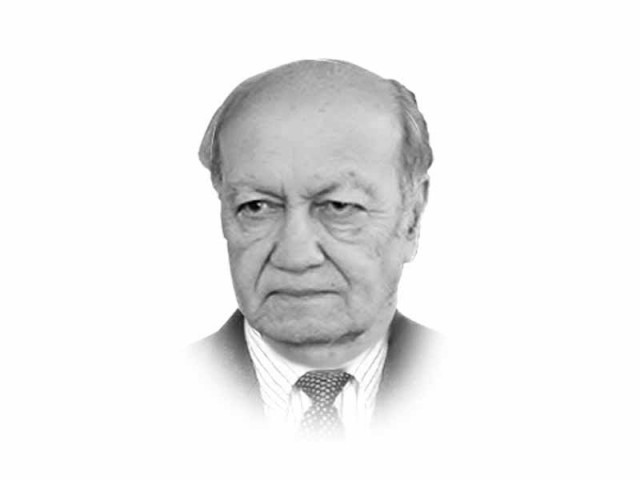Impact of Obama’s visit to India
It is probable that in private, Obama has advised Modi that he should work towards peaceful environment in the region

The writer is a retired lieutenant general of the Pakistan Army and served as chairman of the Pakistan Ordnance Factories Board
It may be politically expedient for the US and other Western countries to keep blaming Pakistan for the sanctuaries in the tribal belt but it is only fair to remind them that these came into being during the Afghan jihad. And after 9/11 during the US invasion of Afghanistan, thousands of Afghan Taliban and global jihadis were pushed into Fata. We, too, share the blame, but the West is equally responsible for the situation that Pakistan and the region are facing.
There is a strategic convergence between India and the US and that is the basic reason why Obama is all out to please the former. Washington has been trying to countervail China’s rising economic and political clout by building a close partnership with India. Moreover, India’s huge market, growing economy and status as the world’s largest democracy are additional key determinants for strengthening ties. As the US is withdrawing forces from Afghanistan, it wants India to play a major role in that country and enhance its influence in the region. In addition, Washington will like to reduce China’s influence in Sri Lanka and the new government there is likely to rebalance relations in favour of India. All this very conveniently fits in with India’s regional aspirations except that it finds Pakistan to be an impediment.
The US, however, is fully aware that Pakistan enjoys a unique position with respect to Afghanistan. As US and Nato forces withdraw from Afghanistan, Pakistan’s role acquires special significance. The US will like to consolidate the gains that it has made in establishing the state structure in Afghanistan. It realises the pivotal role Pakistan can play in supporting stabilisation in Afghanistan. This was very much evident from the importance that General Raheel Sharif was given during his recent visit to the US by the military and civilian leadership. Washington also cannot ignore the reality of Pakistan’s geostrategic importance when it comes to the Middle East and Central Asia.
Suspension of bilateral dialogue by India has led to increased tensions and volatility on the Line of Control and the international border. It is probable that in private, Obama has advised Modi that he should work towards a peaceful environment in the region so that it enables Pakistan to fully focus on the internal threat. There could be some softening on the part of Modi’s government towards Pakistan. However, on Kashmir, New Delhi’s hard position is likely to persist at least in the near future.
Obama’s visit will lead to enhanced cooperation with India in defence and nuclear areas. India’s interest is in acquiring state-of-the-art weapon systems from the US and producing these indigenously through transfer of technology. Traditionally, being the leader in armament technology, the US is cautious in sharing technology. It has to be seen to what extent American weapons manufacturers will be willing to transfer technology and promote indigenous development in India.
A major achievement of the visit has been to clear the objections that stood in the way of implementing the Indo-US civilian nuclear deal signed six years ago. The breakthrough in the deadlock on nuclear agreements will facilitate the sale of US-built nuclear plants to India. With the issue of liability of suppliers sharing the cost in the event of an accident resolved, the obstacle to the purchase of these plants worth billions of dollars has been removed. Washington apparently has also lifted the condition of tracking nuclear material that is used to power nuclear reactors. This agreement will deepen and broaden the strategic partnership on a more enduring basis and elevate India’s nuclear status. Of course, the level of technology transfer, price and other issues still need to be worked out.
India’s enhanced capacity for production of fissile material would be a source of concern for Pakistan. But anticipating this development, Pakistan has largely taken care of it by stepping up its own fissile material production in the last few years. Our counter-strategy seems to be to further strengthen the strategic partnership with China — the rising and only challenger to the US at the global level. Pakistan’s deep strategic relations with China and Saudi Arabia are its countervailing assets.
The army chief’s visit to Beijing is part of his drive to apprise major world powers of Pakistan’s efforts at fighting terrorism and seeking their support. In this connection, he has already had very successful visits to the US and Britain. His visit to Beijing, however, has provided an opportunity to send a strong signal to India that Pakistan has a highly dependable ally in China and is not alone. The remarks of Gen Fan, the Chinese vice-chairman of the Central Military Commission, after his meeting with General Sharif that the two countries are “iron brothers” is a reaffirmation of China’s commitment to stand with Pakistan in its efforts to resist hegemonic pressures. The development of the China-Pakistan economic corridor linking western China with Gwadar, opening to the strait of Hormuz, will also boost bilateral links. In addition, Pakistan is making efforts to improve ties with Russia, which is facing isolation due to US and Western sanctions and is inclined towards broadening its links with countries in South Asia, including Pakistan.
Published in The Express Tribune, January 28th, 2015.
Like Opinion & Editorial on Facebook, follow @ETOpEd on Twitter to receive all updates on all our daily pieces.














COMMENTS
Comments are moderated and generally will be posted if they are on-topic and not abusive.
For more information, please see our Comments FAQ